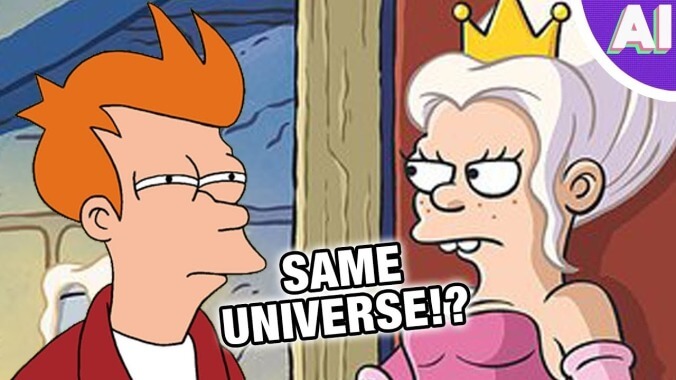Damn it, nerds, stop trying to jam Disenchantment and Futurama into a single shared universe

[Note: This article discusses some extremely minor plot elements from Disenchantment.]
This is why we can’t have nice things and/or fun TV Easter eggs anymore, people: Because it’s apparently inevitable that every single fun little joke in the entire history of pop culture is eventually going to get turned into a 10-minute explainer video, all because people can’t stop themselves from taking these things too damn seriously.
Case in point: The above new Nerdist video, which dives way too deep into the idea that Futurama and Disenchantment might somehow take place in the same timeline, all thanks to a quarter-second gag in the latter show’s first season finale. As highlighted in the clip, from Nerdist’s Hector Navarro and Animation Investigation, the bit in question comes when Eric Andre’s character Luci is using a crystal ball to “rewind” the events playing out in a room of the show’s main castle. For the briefest of frames, we catch a glimpse of Fry, Bender, and Professor Farnsworth cruising through time, from the well-received late-season Futurama episode “The Late Philip J. Fry.” (That’s the one with the time machine that can only go forward, in case you’ve forgotten.)
That’s a great (if slightly self-referential) little joke, a nice nod to David X. Cohen’s last big series and his frequent love of time travel jokes. But why let a simple gag suffice, when you could have elaborate fanon, instead? And so the Nerdist team dives deep into every moment a medieval castle appears in the future history of Futurama’s New New York, trying to pick out the one that’s “most likely” to be the one from Disenchantment’s Dreamland, thus attempting to prove that both shows take place in one big snarl of self-serving continuity.
But we have to ask: Why? What does it serve either story to have them bound to each other through these bonds of conspiracy theory and speculation? (And do we really want another Simpsons-Futurama-style crossover episode?) Sure, it’s hypothetically neat, but isn’t there a point where this encyclopedic need to “solve” all of pop culture starts to simply suck all the joy out of things? (That being said, if any of you can find a way to shove the whole shebang into the tiny little snowglobe known as the Tommy Westphall Universe, hit us up—we’ve got a grand unified theory for that whole crazy thing, and this would really clear some issues up.)